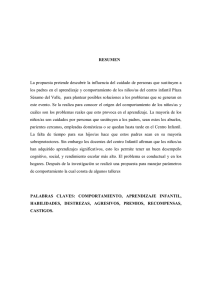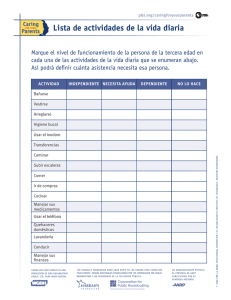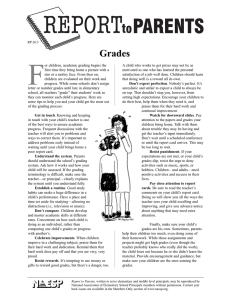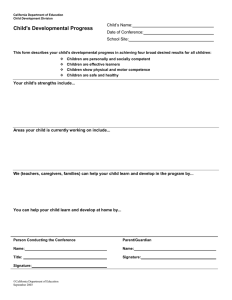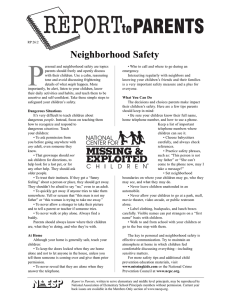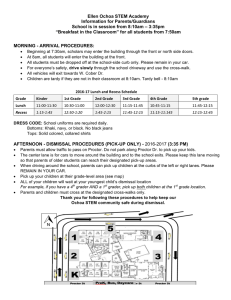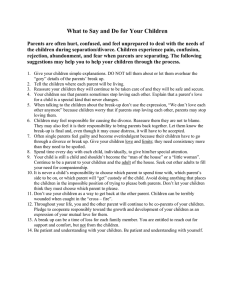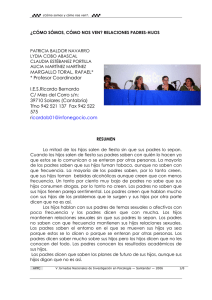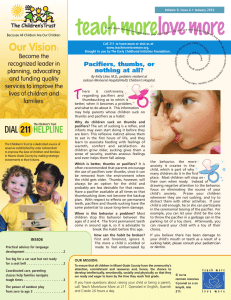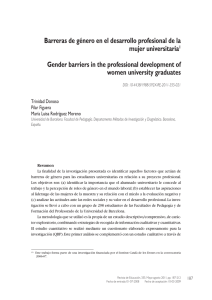Bad Behavior - Montezuma Schools
Anuncio
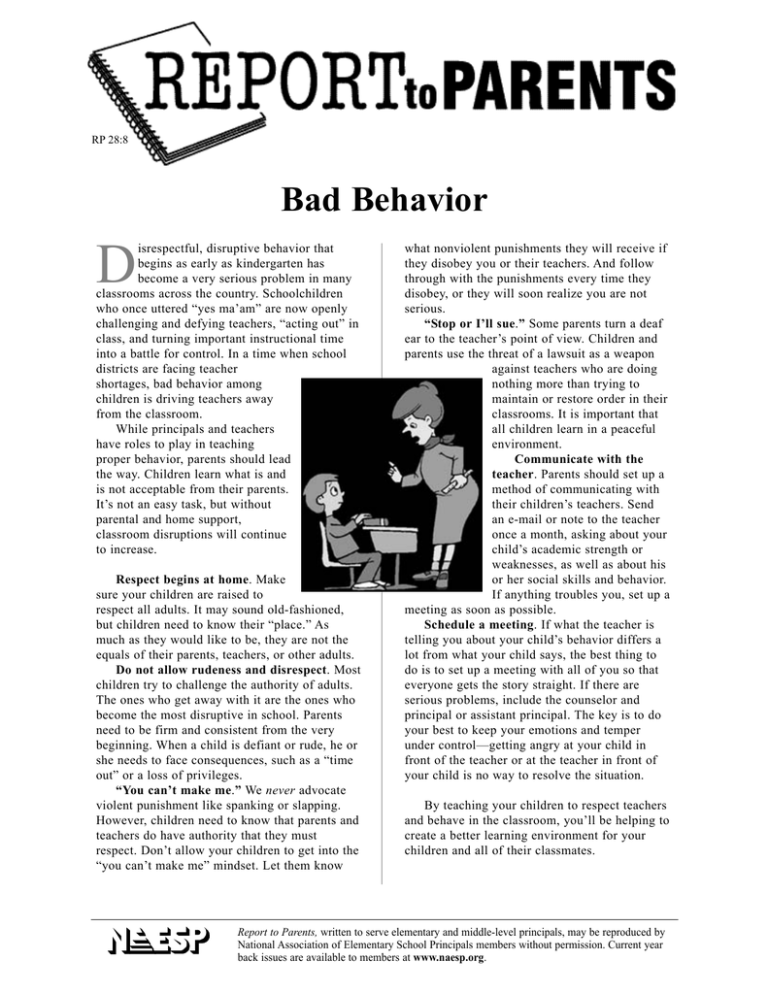
RP 28:8 Bad Behavior isrespectful, disruptive behavior that begins as early as kindergarten has become a very serious problem in many classrooms across the country. Schoolchildren who once uttered “yes ma’am” are now openly challenging and defying teachers, “acting out” in class, and turning important instructional time into a battle for control. In a time when school districts are facing teacher shortages, bad behavior among children is driving teachers away from the classroom. While principals and teachers have roles to play in teaching proper behavior, parents should lead the way. Children learn what is and is not acceptable from their parents. It’s not an easy task, but without parental and home support, classroom disruptions will continue to increase. D Respect begins at home. Make sure your children are raised to respect all adults. It may sound old-fashioned, but children need to know their “place.” As much as they would like to be, they are not the equals of their parents, teachers, or other adults. Do not allow rudeness and disrespect. Most children try to challenge the authority of adults. The ones who get away with it are the ones who become the most disruptive in school. Parents need to be firm and consistent from the very beginning. When a child is defiant or rude, he or she needs to face consequences, such as a “time out” or a loss of privileges. “You can’t make me.” We never advocate violent punishment like spanking or slapping. However, children need to know that parents and teachers do have authority that they must respect. Don’t allow your children to get into the “you can’t make me” mindset. Let them know what nonviolent punishments they will receive if they disobey you or their teachers. And follow through with the punishments every time they disobey, or they will soon realize you are not serious. “Stop or I’ll sue.” Some parents turn a deaf ear to the teacher’s point of view. Children and parents use the threat of a lawsuit as a weapon against teachers who are doing nothing more than trying to maintain or restore order in their classrooms. It is important that all children learn in a peaceful environment. Communicate with the teacher. Parents should set up a method of communicating with their children’s teachers. Send an e-mail or note to the teacher once a month, asking about your child’s academic strength or weaknesses, as well as about his or her social skills and behavior. If anything troubles you, set up a meeting as soon as possible. Schedule a meeting. If what the teacher is telling you about your child’s behavior differs a lot from what your child says, the best thing to do is to set up a meeting with all of you so that everyone gets the story straight. If there are serious problems, include the counselor and principal or assistant principal. The key is to do your best to keep your emotions and temper under control—getting angry at your child in front of the teacher or at the teacher in front of your child is no way to resolve the situation. By teaching your children to respect teachers and behave in the classroom, you’ll be helping to create a better learning environment for your children and all of their classmates. Report to Parents, written to serve elementary and middle-level principals, may be reproduced by National Association of Elementary School Principals members without permission. Current year back issues are available to members at www.naesp.org. RP 28:8 La Mala Conducta a mala conducta irrespetuosa y problemática que comienza a presentarse desde el Zinder esta se ha convertido en un problema serio en muchas de las aulas a través del país. Los estudiantes que una vez decían “Si, Señora,” ahora abiertamente confrontan a sus maestros, “luciéndose” en sus clases, y convirtiendo el tiempo de instrucción en un campo de batalla por el control. Ahora cuando las escuelas están sufriendo escasez de maestros, la mala conducta entre los niños está ahuyentando a los maestros de la sala de clases. A pesar que los directores y maestros juegan un papel importante en enseñar una conducta adecuada, son los padres quienes deberán encabezar la instrucción. Los niños aprenden lo que es y no es aceptable de sus padres. No es una tarea fácil, pero sin el apoyo de los padres en el hogar, el desorden en las aulas continuará aumentando. L El respeto se inicia en el hogar. Asegúrese de que sus niños crezcan respetando a los mayores. Aunque parezca anticuado y pasado de moda, pero los niños necesitan conocer “su lugar.” A pesar de que les encantaría ser los iguales de sus padres, maestros y otros adultos, no lo son. No permita groserías o falta de respeto. La mayoría de los niños tratan de desafiar la autoridad de los adultos. Los que se salen con la suya son los que se convierten en los más desordenados en la escuela. Los padres necesitan ser firmes y consistentes desde el principio. Cuando un niño es desafiante o grosero, él o ella necesita tener consecuencias, tales como “retirarse a su cuarto” o perder privilegios. “No me puedes obligar.” Nunca recomendamos castigos violentos tales como nalguear o abofetear. Sin embargo, los niños necesitan saber que deben respetar la autoridad de sus padres y maestros. No permita que sus niños tomen la actitud de “tú no me puedes obligar.” Hágales saber que aunque sin violencia se les castigará si le desobedecen a usted o a los maestros. Cumpla con el castigo cada vez que no hagan caso o pronto se darán cuenta de que usted no habla en serio. “!Deténgase o lo demando!” Algunos padres prestan oídos sordos al punto de vista de los maestros. Los niños y los padres solían amenazar a los maestros con demandas legales en contra de quienes no hacían otra cosa que mantener o restaurar el orden en las salas de clase. Es importante que los niños aprendan en un ambiente pacífico. Comuníquese con el maestro. Los padres deberían establecer un método de comunicación con los maestros de sus niños. Una vez al mes, envíeles un correo electrónico o recados a los maestros, pregunte acerca de las fortalezas o debilidades académicas de su hijo, así como por su conducta y habilidades sociales. Si tiene alguna preocupación, solicite una reunión con el maestro tan pronto sea posible. Reúnase con el maestro. Si lo que el maestro le dice de su hijo es muy diferente a lo que su hijo le cuenta, lo mejor es hacer una entrevista con todos presentes para tener los hechos en claro. Si hay problemas graves, incluya al consejero, al asistente del director o al director de la escuela. La clave es hacer lo mejor posible para mantener sus emociones y temperamento bajo control—enojarse con su hijo en frente del maestro o con el maestro en frente de su hijo no ayudará a resolver la situación. Al enseñar a sus niños a respetar a sus maestros y a comportarse en la sala de clases, usted estará ayudando a crear un mejor ambiente de aprendizaje para sus hijos y sus compañeros de clase. Este Informe a Los Padres fue escrito para los directores escolares. Los miembros de la Asociación Nacional de Directores de Escuelas Primarias (NAESP) pueden reproducirlo sin permiso. Las últimas ediciones de este año están accesibles en la sección de los miembros en www.naesp.org.
